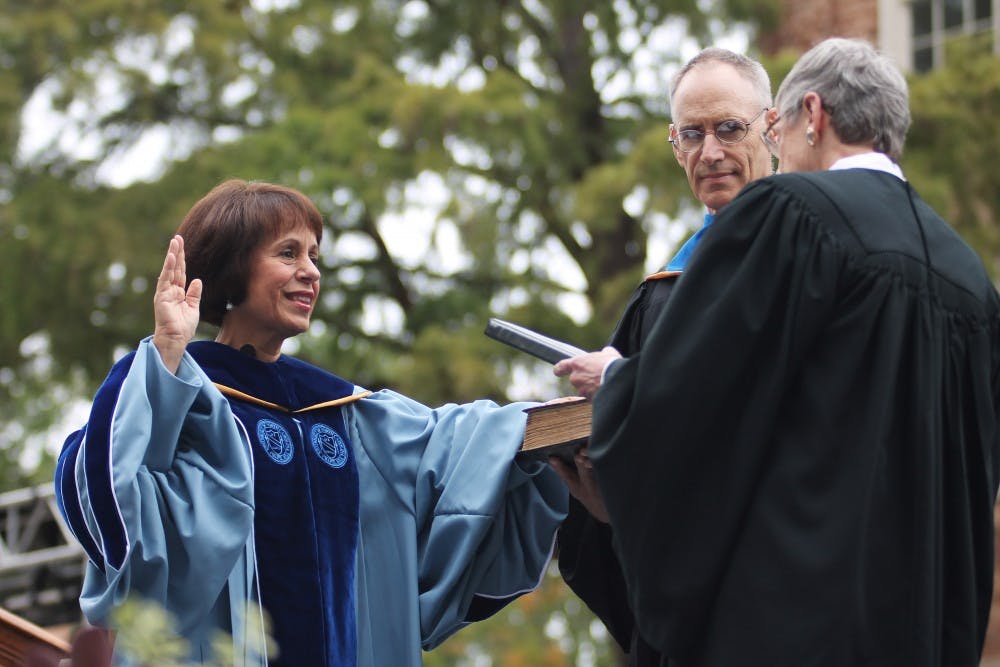In fall 2018, for example, there were 1,819 full-time faculty members who were tenured or on the tenure track — of which 714 were females.
To better understand salary discrepancies on campus, Wissick said the committee has conducted its own studies and worked closely with members of the administration.
“I think we are starting to make sense of it, and I think there is still things that have to be better there,” he said. “For all the improvements, women still do not seem to be paid across the board as men are for the same work. It’s getting better, but it isn’t there yet.”
Wissick said the committee has strived to enhance the female experience on campus by supporting women’s rights in general, including supporting the creation of lactation rooms that are now legally required to exist on campus.
Interim Dean of the College of Arts and Sciences Terry Rhodes said the University has its work to do in terms of understanding the responsibilities that especially face women — like the care of children and elders.
“There is definitely room for growth,” Rhodes said. “We have made progress, but also that is why the Status of Women Committee in the University helps us see recommendations for the University.”
Hallee Haygood is a graduate student working toward attaining a dual master's degree in the public administration and city and regional planning programs at UNC.
Haygood said she feels as if the University has done well in terms of making resources for women on campus visible, like the creation of the Carolina Women’s Center, which strives to ensure that there are no gender barriers to success at UNC. But, she believes the University should focus more on issues relevant to transgender women.
“When it comes to transgender issues, I think Carolina could do a much better job about providing support and increasing access to resources,” Haygood said. “I think a map for gender neutral bathrooms on campus would be really great because that is something incredibly important, that is something we lack for transgender women.”
Haygood said the University should also improve programming on campus to address topics like the imposter syndrome and wage negotiation, which many female graduate and undergraduate students struggle with.
She said focusing on intersectional women when creating University policies should be at the forefront of administrators’ minds moving forward.
“I also think that a lot of our education for women in general is focused on white women,” Haygood said. “We should be more inclusive — especially when thinking of women of color and things like the pay gap and wage negotiations because that is a huge issues.”
To get the day's news and headlines in your inbox each morning, sign up for our email newsletters.
Dean Barbara Rimer of the Gillings School of Global Public Health suggested the importance of looking at the intersectionalities of gender when thinking about ways to improve the University in the future.
“Although it is still the case that women are underrepresented in some fields and roles, I believe the challenges at UNC-Chapel Hill are more often about increasing race and ethnic diversity than gender diversity,” Rimer said.
Within the School of Public Health, leadership is somewhat balanced between men and women, Rimer said. But race and ethnic diversity, she said, is where the school is lacking.
Wissick said he feels that there is still a lot of work to be done for women on campus, but is proud there are many women in prominent positions within the University.
Susan King began serving as dean of the Hussman School of Journalism and Media in 2012. She said she did not begin her time as dean with any vision specific to improving the position of women within the journalism school because the female leadership that preceded her was so great.
But with 75 percent of the students within the journalism school identifying as women, King said she believes the faculty should reflect that demographic. She said she has strived to advance more women into leadership roles this past decade because of it.
“I’m going to be very honest, I think we have strong women leadership in the school,” King said. “We have amazing students who are predominately women, and I must as a leader push constantly to make room for women at the top. So my job is to keep pushing the doors.”
Despite the changing societal norms of this past decade, Rhodes said she recognizes the external challenges — like juggling scholarly commitments with family responsibilities — that come along with being a female leader at the University.
“We are now in a society where men are taking on these roles in the family and in the house so that women can reach their potential,” Rhodes said. “But there are still challenges with that, and I’ll tell you that I am well aware of that.”
Dean Nena Peragallo of the UNC School of Nursing said that unlike other schools across the University, the majority of the school's population has consistently been female. She said she hopes her students will be inspired by the increased number of female deans on campus to seek leadership positions in their own careers.
"I think we are making progress that is slow, but I think everyone is pushing in the same direction — so that is important that we all support each other and really make sure that we are getting to those positions of influence and power," Peragallo said. "It’s also important that we mentor the next generation to come to have those ambitions. We need to extend our hand to those who are coming.”
@evelyaforte
university@dailytarheel.com



